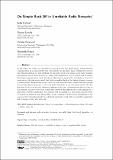On simple back-off in unreliable radio networks
Author(s)
Gilbert, S; Lynch, N; Newport, C; Pajak, D
DownloadPublished version (529.4Kb)
Publisher with Creative Commons License
Publisher with Creative Commons License
Creative Commons Attribution
Terms of use
Metadata
Show full item recordAbstract
© Seth Gilbert, Nancy Lynch, Calvin Newport, and Dominik Pajak. In this paper, we study local and global broadcast in the dual graph model, which describes communication in a radio network with both reliable and unreliable links. Existing work proved that efficient solutions to these problems are impossible in the dual graph model under standard assumptions. In real networks, however, simple back-off strategies tend to perform well for solving these basic communication tasks. We address this apparent paradox by introducing a new set of constraints to the dual graph model that better generalize the slow/fast fading behavior common in real networks. We prove that in the context of these new constraints, simple back-off strategies now provide efficient solutions to local and global broadcast in the dual graph model. We also precisely characterize how this efficiency degrades as the new constraints are reduced down to non-existent, and prove new lower bounds that establish this degradation as near optimal for a large class of natural algorithms. We conclude with an analysis of a more general model where we propose an enhanced back-off algorithm. These results provide theoretical foundations for the practical observation that simple back-off algorithms tend to work well even amid the complicated link dynamics of real radio networks.
Date issued
2018Department
Massachusetts Institute of Technology. Department of Electrical Engineering and Computer Science; Massachusetts Institute of Technology. Computer Science and Artificial Intelligence LaboratoryJournal
Leibniz International Proceedings in Informatics, LIPIcs
Citation
Gilbert, S, Lynch, N, Newport, C and Pajak, D. 2018. "On simple back-off in unreliable radio networks." Leibniz International Proceedings in Informatics, LIPIcs, 125.
Version: Final published version